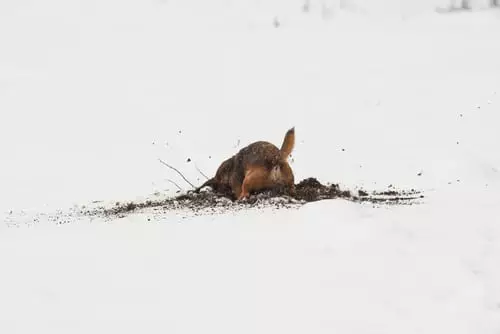Digging is a behavior that is often as baffling to dog owners as it is instinctual to some breeds. While every dog may indulge in the occasional excavation, certain breeds have a natural proclivity for it, resulting in lawns and gardens that bear the scars of their enthusiasm. This deeply ingrained instinct, stemming from their ancestry as hunting and working dogs, can lead to significant challenges for owners. Understanding these behaviors not only sheds light on canine behavior, but also aids in preventing destructive habits that can accompany them.
Terriers: The Masters of Burrowing
Terriers, by their very nature, stand out for their digging prowess. Take, for instance, the Cairn Terrier, a small yet spirited breed originally bred to chase and catch small rodents in the Scottish Highlands. Their tenacity is matched only by their speed, making them expert diggers who can unearth prey lurking below the surface. Similarly, the Bedlington Terrier adds a twist with its lamb-like appearance, yet its history as a miner’s companion for hunting vermin speaks volumes about its digging expertise. The Bedlington’s playful demeanor belies its natural hunting instincts, illustrating how even the most unassuming dogs carry the legacy of their purpose in their behavior.
For the Dachshund, digging is literally in their DNA. Designed specifically to access burrows with their elongated bodies and short legs, this breed thrives on the thrill of the chase beneath the soil. Although they make delightful companions, neglecting their exercise needs can quickly turn them into annoying diggers, seeking to fulfill their instinctive drives in any way possible.
Hounds: An Inherent Desire to Dig
Basset Hounds, with their signature droopy ears and laid-back nature, may appear too relaxed to excavate, but beneath this facade lies a steadfast instinct to dig. Bred to hunt game deep in the underbrush, they are skilled diggers in their own right. They embrace this instinct even during leisurely pursuits, leading to potential problems for unprepared homeowners.
Similarly, Beagles possess an exceptional sense of smell paired with strong digging instincts, honed through generations of rabbit hunting. Their delightful demeanor can quickly turn into a challenge when they chase a scent, often to the detriment of well-tended gardens. The Bloodhound, known for its tracking prowess and droopy expression, is less about burrowing but will dig if boredom strikes. Their vast size and need for activity can result in considerable disruption if not addressed correctly.
The Energy of the Northern Breeds
When it comes to northern dog breeds, digging often relates closely to temperature regulation. Siberian Huskies and Alaskan Malamutes, both bred for cold climates, exhibit digging behaviors when faced with warm weather, seeking out cooler soil as a natural cooling system. This behavior can quickly become problematic if left unmanaged, as these energetic breeds require ample exercise and stimulation to prevent them from resorting to digging out of boredom.
The Chow Chow, another breed lesser known for digging, engages in this behavior in warm conditions to keep cool. Though these dogs are often seen lounging gracefully at home, their natural instincts can lead them to explore their environment compulsively when conditions aren’t in their favor.
The Lesser-Known Digging Enthusiasts
Among the many breeds that exhibit a penchant for digging, the West Highland White Terrier, affectionately known as the Westie, exemplifies the connection between historical necessity and modern behavior. Originally bred to hunt rodents, their energetic and inquisitive nature leads them to dig in pursuit of a playful chase, making them a delightful, albeit potentially disruptive, addition to any home.
Likewise, the Australian Terrier exemplifies another breed born from utility, with a storied background in vermin elimination. Their history ingrains in them a strong rooting instinct, and without proper mental and physical engagement, they can channel this instinct into unwanted digging habits.
The Importance of Understanding Digging Behaviors
Recognizing these breeds’ unique histories and tendencies takes us a step closer to effective management of their instincts. Digging need not be a destructive problem for owners; instead, it can be an opportunity for engagement. Regular exercise, stimulating games, and dedicated training can redirect these energies into more constructive outlets, preserving not just private gardens but fostering happier, healthier dogs. Understanding your dog’s breed-specific tendencies is essential in crafting an environment where they can thrive, turning instinctual behaviors from nuisances into fulfilling activities.

